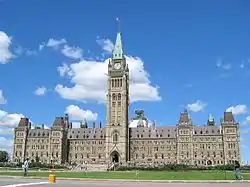Emergencies Act
The Emergencies Act (French: Loi sur les mesures d'urgence) is an act of the Parliament of Canada to authorize the taking of special temporary measures to ensure safety and security during national emergencies. It is considered to provide, "the stiffest government emergency powers of any emergency law in Canada."[1]:16
| Emergencies Act | |
|---|---|
 | |
| Parliament of Canada | |
| |
| Citation | Emergencies Act, R.S.C. 1985, c. 22, as amended by S.C. 2001, c. 27 |
| Enacted by | Parliament of Canada |
| Royal assent | July 21, 1988 |
| Repeals | |
| War Measures Act | |
| Amended by | |
| Immigration and Refugee Protection Act | |
| Summary | |
| Authorizes the taking of special temporary measures to ensure safety and security during national emergencies and to amend other Acts in consequence thereof | |
| Status: Current legislation | |
It received royal assent on July 21, 1988, replacing the War Measures Act.
The Emergencies Act differs from the War Measures Act in two important ways:
- A declaration of an emergency by the Cabinet must be reviewed by Parliament
- Any temporary laws made under the act are subject to the Charter of Rights and Freedoms.
Thus any attempt by the government to suspend the civil rights in Canada, even in an emergency, will be subject to the "reasonable and justified" test under section 1 of the Charter.[1]:12[2][3]
There are four types of emergencies listed under the act: a public welfare emergency; a public order emergency; an international emergency; and a war emergency.[4]
Uses
The Emergencies Act has never been used.[5] The War Measures Act, which this act replaced, was used on three occasions: during both the First and Second World Wars, and during the 1970 October Crisis.[2]
On April 9, 2020, Prime Minister Justin Trudeau sent a letter to the provincial and territorial premiers to consult about invoking the Emergencies Act due to the COVID-19 pandemic in Canada.[6] While consultation with the provinces is a required step before the act can be triggered, the Prime Minister's Office said there was no present plan to invoke it and that doing so remained a last resort.[7][8] On a conference call between Trudeau and the premiers later that day, the premiers communicated their unanimous opposition to invoking the act.[9][10]
References
- Forcese, Craig; West, Leah (2020-03-14). "Ch 8 -- Emergencies". National Security Law 2d Ed. Rochester, NY: Irwin Law.
- Smith, Denis; Foot, Richard; Yarhi, Eli; McIntosh, Andrew (18 March 2020). "Emergencies Act". The Canadian Encyclopedia. Retrieved 9 April 2020.
- Balakrishnan, Anita. "Emergencies Act different than 'any other law of Canada'". www.canadianlawyermag.com. Retrieved 2020-04-10.
- Aiello, Rachel (2020-11-15). "'It's time for the hammer' to get second wave under control: Dr. Sharkawy". CTV News.
- Bensadoun, Emerald (17 March 2020). "Coronavirus: How the Emergencies Act could help Canada's struggling economy". Global News. Retrieved 17 March 2020.
- Tunney, Catharine; Hall, Chris (9 April 2020). "As supply concerns grow, Ottawa lays the groundwork for never-used Emergencies Act". CBC News. Retrieved 9 April 2020.
- Lynn, Josh (9 April 2020). "In wake of letter sent by feds, Sask. premier doesn't 'see the need' to invoke Canada's Emergencies Act". CTV News. Retrieved 9 April 2020.
- Taylor, Stephanie (9 April 2020). "Saskatchewan premier doesn't see need for Emergencies Act in COVID-19 fight". National Post. Retrieved 9 April 2020.
- Tunney, Catharine; Cullen, Catherine; Cochrane, David (10 April 2020). "Need for Emergencies Act rejected by premiers on call with PM". CBC News. Retrieved 10 April 2020.
- Lilley, Brian (10 April 2020). "Premiers say no to Trudeau on Emergencies Act". Toronto Sun. Retrieved 11 April 2020.